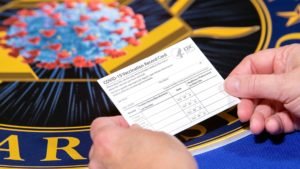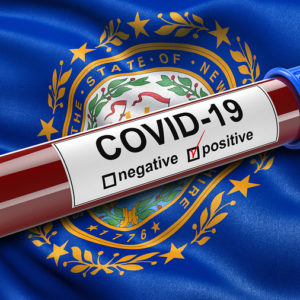Will the new COVID-19 vaccines be added to the list of mandatory inoculations for school kids? Can employers require their employees to prove they’ve been vaccinated? Can a business refuse to serve customers who’ve refused the vaccine?
The New Hampshire Department of Justice is issuing guidelines to address some of the difficult questions raised by the slow rollout of the COVID vaccines, such as the use of vaccination cards as so-called “immunity passports.”
“The purpose of this document is to provide employers, employees and businesses with frequently asked questions and answers that may be used to evaluate their options and to assist in responding to inquiries from their communities,” the NHDOJ said in a statement.
Among the questions the new NH DOJ guidance addresses:
— Will the COVID-19 vaccines be added to the list of mandatory vaccinations for schools? (Not at this time.)
— Can an employer require its employees to get a COVID-19 vaccine in order to come to work? (Yes, but it’s not recommended.)
— Can a business require customers to show proof of COVID-19 vaccination in order to patronize that business? (Generally, yes — but there is potential legal hazard).
In addition to the logistical challenges presented by rolling out a two-dose vaccine over six months during a deadly pandemic, there are political and privacy challenges as well.

Department of Defense-issued vaccination card.
New Hampshire state officials insist the personal vaccination cards being issued by the Department of Defense with every dose are intended for personal use only. Their purpose is to keep track of which vaccine you’ve received and if/when you’ve received a second dose if needed. State Epidemiologist Dr. Ben Chan has compared it to a reminder card from a doctor’s appointment.
But data is data, and the availability of that data has raised questions about how both governments and private businesses might use it. Countries like the U.K., Italy and Chile, as well as states like New York, have discussed the notion of an “immunization passport,” giving people who can document their vaccination status more liberty to conduct business during the COVID crisis. The World Health Organization has discussed the idea as well.
And according to the NHDOJ, businesses and individuals are free to use the data that way, within the boundaries of federal civil rights laws.
So, for example, once the vaccine is more widely available, would a restaurant owner be allowed to hire only vaccinated employees?
“Yes, employers could require it,” says Senior Assistant Attorney General Jill Perlow. “If there’s not a disability, or religious aspect or some other potentially discriminatory issue at play, that would be an allowable restriction that an employer could impose.” And, Perlow says, barring other necessary accommodations, businesses could require customers to reveal their vaccination status before entering their store, bar or restaurant as well.
Some private businesses, particularly airlines and the travel industry, are already interested in apps that could allow their customers to enter and store immunization information, test results and other medical documents — similar to your TSA Precheck info.
However, the NHDOJ guidelines urge employers and businesses not to mandate vaccines for employees or customers.
“Because the Pfizer-BioNTech and Moderna COVID-19 vaccines have been approved through an Emergency Use Authorization (EUA), the State does not intend to mandate these vaccines in any way and generally does not recommend that these vaccines (or any other COVID-19 vaccine approved through an EUA) be mandated for employees or customers.”
The concept has raised concerns among medical ethicists and civil rights advocates. “Immunity passports would impose an artificial restriction on who can and cannot participate in social, civic and economic activities,” Alexandra Phelan, an assistant professor at Georgetown University Medical Center, wrote in The Lancet.
Maybe so, but the concept doesn’t violate New Hampshire law. At the same time, there are still restrictions in place to protect some personal freedoms of Granite Staters. For example, schools cannot require students to get the current COVID-19 vaccination, because it has only received emergency approval from the Food and Drug Administration. But that could change when the vaccines receive full FDA approval next year, at which time it could become part of the mandated school vaccination regime.
Some Granite Staters are concerned about the data being stored in the state’s new — and mandatory — COVID-19 registry. But officials inside the Sununu administration tell NHJournal the state is only keeping data as long as required by the FDA. Once that window closes, Granite Staters will be free to have their records removed.
And what about mandating the COVID-19 vaccine for everyone? Currently, the rules regarding these vaccines are covered under executive orders issued by Gov. Chris Sununu — the new, mandatory vaccination database created by the state, for example. If the Granite State fails to reach a herd-immunity level of vaccinations, could Sununu issue a statewide vaccination mandate?
“I’m not aware of any existing statutory barrier to it,” Perlow said.
Members of the New Hampshire Legislature on both sides of the aisle have said they want to look at the scope of gubernatorial emergency powers, and several N.H. Republicans tell NHJournal they’re specifically interested in the vaccination question in the wake of the COVID-19 pandemic. It’s all but certain this issue will be debated in Concord in the coming months.
Meanwhile, the DOJ’s guidance is designed to answer questions and help private businesses, school boards and local governments look ahead at difficult issues likely to arise as New Hampshire inevitably becomes a state of vaccine haves and have nots.

